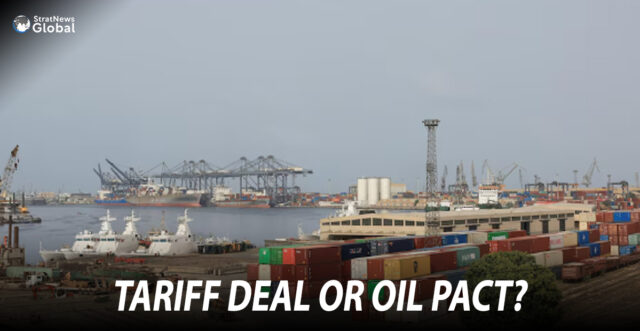The United States and Pakistan announced a new deal that Islamabad said would reduce tariffs on its exports, while President Donald Trump emphasised a separate pact aimed at developing Pakistan’s oil reserves.
Neither mentioned the tariff rate agreed.
Pakistan, which Washington has designated a “major non-NATO ally” in its effort to counter rival China’s influence in the region, faced a potential tariff of 29% declared in April that was later suspended for 90 days to allow trade talks.
“We have just concluded a Deal with the Country of Pakistan, whereby Pakistan and the United States will work together on developing their massive Oil Reserves,” Trump wrote on social media.
“We are in the process of choosing the Oil Company that will lead this Partnership.”
He gave no further details.
‘Deal Concluded’
Pakistani Foreign Minister Ishaq Dar also confirmed the deal. “Deal concluded,” he told Reuters, without elaborating.
Although Trump did not mention a tariff deal, Pakistan’s finance ministry said on Thursday it would lead to “reduction of reciprocal tariffs, especially on Pakistani exports to the United States”, but stopped short of revealing the figure.
“This deal marks the beginning of a new era of economic collaboration, especially in energy, mines and minerals, IT, cryptocurrency and other sectors,” it said.
The deal was a win-win situation for both nations, Finance Minister Muhammad Aurangzeb, who led the final round of talks in Washington, said in video remarks.
“From our perspective, it was always going beyond the immediate trade imperative, and its whole purpose was, and is, that trade and investment have to go hand in hand,” he added in the statement from his office.
Last week, Dar said both nations were “very close” to a trade deal that could come within days, after he met Secretary of State Marco Rubio on Friday.
They discussed expanding trade and ties in critical minerals and mining, the two sides said afterwards. Other Pakistani officials have also visited for talks in recent weeks.
Under Trump, Washington has sought to renegotiate trade deals with many countries, which he threatened with tariffs for trade relations he calls unfair, a characterisation many economists dispute.
U.S. total goods trade with Pakistan was an estimated $7.3 billion in 2024, the Office of the U.S. Trade Representative says on its website, up from about $6.9 billion in 2023.
In 2024, its goods trade deficit with Pakistan was $3 billion, up 5.2% from 2023.
25% Tariff On Indian Exports
Trump also said Washington was still negotiating with India on trade after he declared a tariff of 25% on goods imported from Pakistan’s arch foe would start from Friday.
Pakistan recently said it “appreciated the pivotal role” of Trump and Rubio “in de-escalating tensions between Pakistan and India by facilitating a ceasefire.”
Trump has repeatedly taken credit for the India-Pakistan ceasefire he announced on social media on May 10 after Washington’s talks with both sides.
India disputes Trump’s claims that the ceasefire resulted from his intervention and trade threats.
India’s position is that New Delhi and Islamabad must resolve problems directly with no outside involvement.
The latest escalation in the decades-old India-Pakistan rivalry was triggered by a deadly April 22 attack by Pakistani terrorists in Jammu and Kashmir’s Pahalgam.
Islamabad, however, denied responsibility.
India struck terrorist infrastructure in Pakistan and Pakistan-occupied Kashmir (PoK) on May 7, and they exchanged deadly hostilities until the ceasefire.
(With inputs from Reuters)





